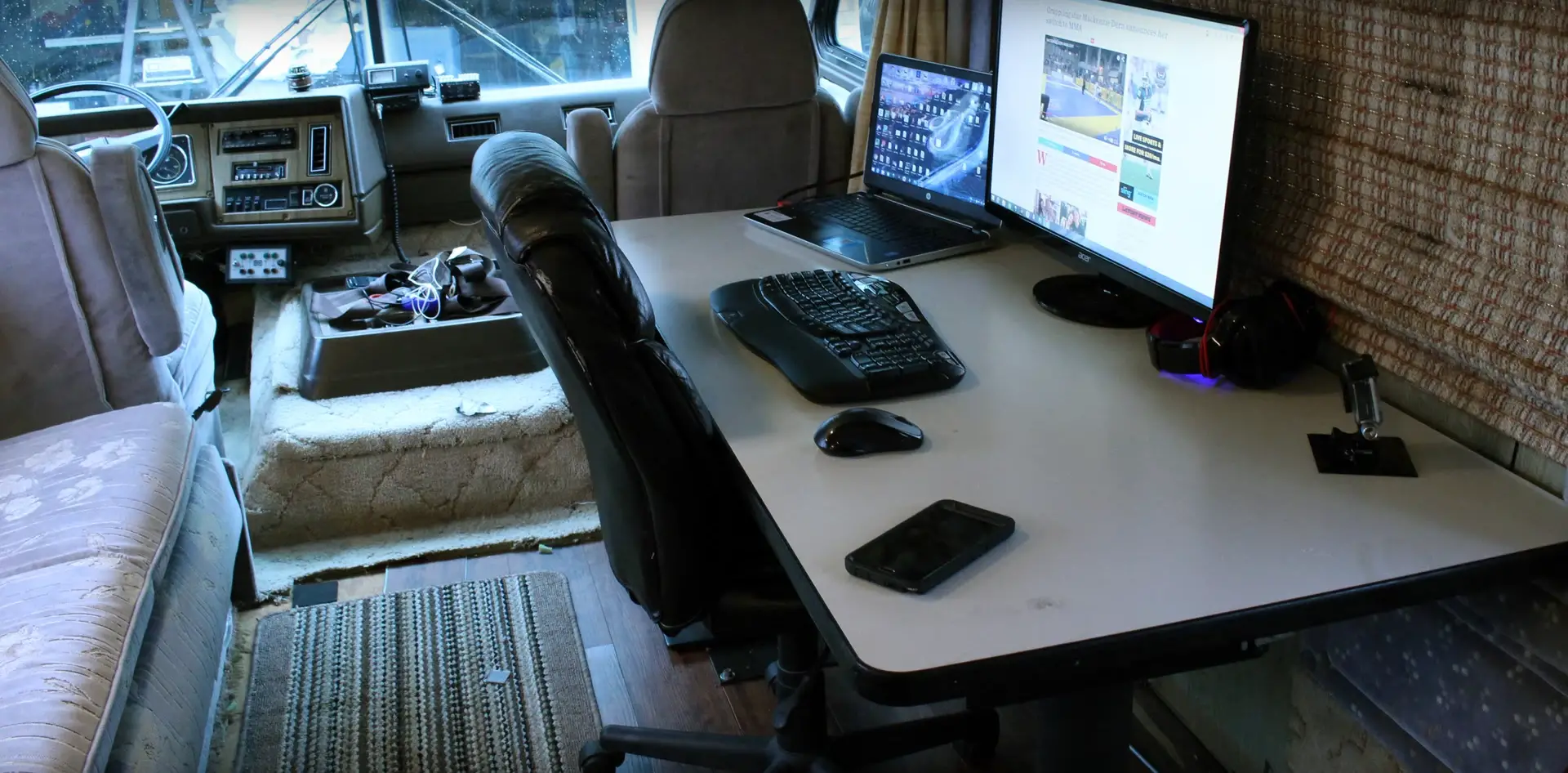
How to Set Up a Home Office in Your RV
With a little creativity, it is possible to set up a very comfortable and functional home office in an RV. Selecting your space and furnishings carefully, protecting your electronics, and finding a reliable way to get online will enable you to efficiently run a business or work for an employer on the road.
Table of Contents
Finding Space for a Home Office in Your RV
First, do you need a home office in your RV? For casual computer work, many people are happy with a recliner and a lap tray. But if you work from home, a dedicated home office, preferably one that lets you shut the door on it, is desirable, and achievable in all but the smallest RVs.
- If you are buying a brand new RV, you can have your RV custom-made to include home office space. A less expensive solution is to buy a model that offers a computer desk as an option.
- Some RVs come with a closet that is plumbed for a washing machine. If you don’t need the washer, you can create a compact office in the closet.
- If you do not eat at the table, it is possible to convert the dinette area into office space.
- Agile folks might consider buying a class C motorhome with a rear bedroom, using the bedroom as an office, and sleeping in the over-cab bunk.
- A toy hauler’s garage could be converted into a sizable home office if the space is not needed for parking.
- Some larger units come with a master suite and a powder room. One of the bathrooms could be converted into an office.
Furnishings
It is possible to bring in any type of furnishings that will fit into your RV home office; they don’t need to be made for RVs. You must be mindful of weight, however! A solid oak office suite might fit into your home office, but could over weigh the rig. The same consideration must be made for filing cabinets and bookcases since paper weighs a lot.
Be sure to secure the furniture to your RV. For example, a desk can be screwed into wall studs or the floor using brackets.
A comfortable computer chair is a must and it can be on casters; simply remember to lay the chair on its side when traveling to keep it from rolling around!
When choosing furniture for your RV home office, consider pieces with drawers and doors rather than shelves, so that things can be safely tucked away for travel.
Electronics and Electricity
Desktop computer or laptop?
While it may seem more intuitive to use a laptop in your RV home office, it is possible to set up a desktop computer in an RV. It depends on your traveling style and how much time you spend plugged into shore power or how much money you are willing to invest in a solar power setup. Some like the portability of a laptop while others prefer the larger screen and potentially cheaper cost of a desktop computer.
Printers
Printers can be power hogs, a laser printer much more so than an ink jet. An energy efficient laser printer comes in at 580 watts, while a non-efficient ink jet printer can come in at 50 watts, with some as little as 13 watts.
If using a laser printer, make sure it is plugged into a circuit with enough amperage and that you do not run other appliances, such as a vacuum cleaner, at the same time.
An all-in-one printer/scanner/copier is practical and would make your RV home office much more self-dependent.
Finally, a shredder is a must for destroying personal documents.
Protecting Your Electronics
At minimum, you will want to plug your electronics into an uninterrupted power supply offering surge protection. At best, consider whole RV surge protection, which will protect every electronic in your RV from a worst-case scenario such as a lightning strike.
Getting Online
There are three ways to get online on the road.
Satellite
This method is the most expensive, but will give you the best coverage. Your options are a roof-mounted dish or one on a tripod. The latter is several thousand dollars less expensive, but is fussier to set up, so it may not be practical for those who are frequently on the move. A satellite system does limit where you can park, as you will need a clear line of sight to the south. Therefore, satellite is not an option for those who frequently park under heavy tree cover.
Air Card/USB modem
This method offers coverage anywhere there is cell phone service. Be sure to pick the provider with the widest coverage, or which offers an advantageous roaming plan. Speed and quality of the service can vary widely, and the addition of an external amplifier and booster can significantly improve your air card’s performance.
Wi-Fi Hot Spots
Using wi-fi hot spots makes you reliant on other people for coverage and is the least desirable option for someone who absolutely needs internet access to do business. You will be limited in what you can do (e.g. large downloads or streaming), you may not be able to get service at home, and you may need to pay a fee to join the network.
Once you have a reliable internet connection, you can consider using your computer to make and receive calls much more cheaply than with a cell phone, depending on your bandwidth allowance and usage.
Now that you have made space for a home office in your RV, furnished it, protected your electronic equipment, and found a reliable way to get online, you will be able to enjoy working in an environment where the view outside your window changes frequently. That sure beats the daily commute!


